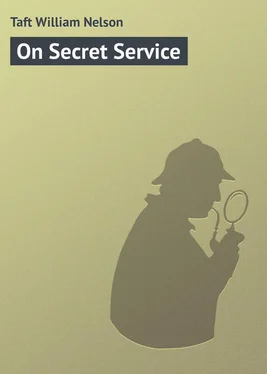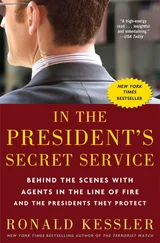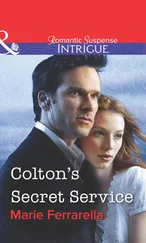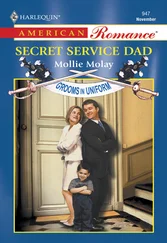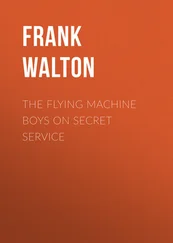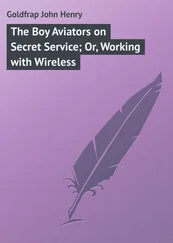William Taft - On Secret Service
Здесь есть возможность читать онлайн «William Taft - On Secret Service» — ознакомительный отрывок электронной книги совершенно бесплатно, а после прочтения отрывка купить полную версию. В некоторых случаях можно слушать аудио, скачать через торрент в формате fb2 и присутствует краткое содержание. Жанр: foreign_language, Классический детектив, foreign_detective, foreign_prose, на английском языке. Описание произведения, (предисловие) а так же отзывы посетителей доступны на портале библиотеки ЛибКат.
- Название:On Secret Service
- Автор:
- Жанр:
- Год:неизвестен
- ISBN:нет данных
- Рейтинг книги:3 / 5. Голосов: 1
-
Избранное:Добавить в избранное
- Отзывы:
-
Ваша оценка:
- 60
- 1
- 2
- 3
- 4
- 5
On Secret Service: краткое содержание, описание и аннотация
Предлагаем к чтению аннотацию, описание, краткое содержание или предисловие (зависит от того, что написал сам автор книги «On Secret Service»). Если вы не нашли необходимую информацию о книге — напишите в комментариях, мы постараемся отыскать её.
On Secret Service — читать онлайн ознакомительный отрывок
Ниже представлен текст книги, разбитый по страницам. Система сохранения места последней прочитанной страницы, позволяет с удобством читать онлайн бесплатно книгу «On Secret Service», без необходимости каждый раз заново искать на чём Вы остановились. Поставьте закладку, и сможете в любой момент перейти на страницу, на которой закончили чтение.
Интервал:
Закладка:
"Who," he inquired of that individual, "has charge of the operation of that phonograph sign on the roof?"
"Doan know fuh certain, suh, but Ah think it's operated by a man down the street a piece. He's got charge of a bunch of them sort o' things. Mighty funny kinder way to earn a livin', Ah calls it – flashing on an' off all night long…"
"But where's he work from?" interrupted Callahan, fearful that the negro's garrulousness might delay him unduly.
"Straight down this street three blocks, suh. Then turn one block to yo' left and yo' cain't miss the place. Electrical Advertisin' Headquarters they calls it. Thank you, suh," and Callahan was gone almost before the watchman could grasp the fact that he held a five-dollar bill instead of a dollar, as he thought.
It didn't take the Secret Service man long to locate the place he sought, and on the top floor he found a dark, swarthy individual bending over the complicated apparatus which operated a number of the electric signs throughout the city. Before the other knew it, Callahan was in the room – his back to the door and his automatic ready for action.
"Up with your hands!" snapped Callahan. "Higher! That's better. Now tell me where you got that information you flashed out to sea to-night by means of that phonograph sign up the street. Quick! I haven't any time to waste."
" Si, si, señor ," stammered the man who faced him. "But I understand not the English very well."
"All right," countered Callahan. "Let's try it in Spanish," and he repeated his demands in that language.
Volubly the Spaniard – or Mexican, as he later turned out to be – maintained that he had received no information, nor had he transmitted any. He claimed his only duty was to watch the "drums" which operated the signs mechanically.
"No drum in the world could make that sign flash like it did to-night," Callahan cut in. "For more than fifteen minutes you sent a variation of the Morse code seaward. Come on – I'll give you just one minute to tell me, or I'll bend this gun over your head."
Before the minute had elapsed, the Mexican commenced his confession. He had been paid a hundred dollars a week, he claimed, to flash a certain series of signals every Saturday night, precisely at nine o'clock. The message itself – a series of dots and dashes which he produced from his pocket as evidence of his truthfulness – had reached him on Saturday morning for the two preceding weeks. He didn't know what it meant. All he did was to disconnect the drum which operated the sign and move the switch himself. Payment for each week's work, he stated, was inclosed with the next week's message. Where it came from he didn't know, but the envelope was postmarked Washington.
With his revolver concealed in his coat pocket, but with its muzzle in the small of the Mexican's back, Callahan marched his captive back to the hotel and up into his room. As he opened the door the telephone rang out, and, ordering the other to stand with his face to the wall in a corner – "and be damn sure not to make a move" – the government agent answered the call. As he expected, it was Thurber.
"The code's a cinch," came the voice over the wire from Washington. "But the message is infernally important. It's in German, and evidently you picked it up about two sentences from the start. The part you gave me states that the transport America , with twelve thousand men aboard, will leave Norfolk at daylight Monday. The route the ship will take is distinctly stated, as is the personnel of her convoy. Where'd you get the message?"
"Flashes in the night," answered Callahan. "I noticed that an electric sign wasn't behaving regularly – so I jotted down its signals and passed them on to you. The next important point is whether the message is complete enough for you to reconstruct the code. Have you got all the letters?"
"Yes, every one of them."
"Then take down this message, put it into that dot-and-dash code and send it to me by special messenger on one of the navy torpedo boats to-night. It's a matter of life and death to thousands of men!" and Callahan dictated three sentences over the wire. "Got that?" he inquired. "Good! Get busy and hurry it down. I've got to have it in the morning."
"Turn around," he directed the Mexican, as he replaced the receiver. "Were you to send these messages only on Saturday night?"
" Si, señor. Save that I was told that there might be occasions when I had to do the same thing on Sunday night, too."
"At nine o'clock?"
" Si, señor. "
Callahan smiled. Things were breaking better than he had dared hope. It meant that the U-boat would be watching for the signal the following night. Then, with proper emphasis of the automatic, he gave the Mexican his orders. He was to return to his office with Callahan and go about his business as usual, with the certainty that if he tried any foolishness the revolver could act more quickly than he. Accompanied by the government agent, he was to come back to the Monticello and spend the night in Callahan's room, remaining there until the next evening when he would – promptly at nine o'clock and under the direction of an expert in telegraphy – send the message which Callahan would hand him.
That's practically all there is to the story.
"All?" I echoed, when Quinn paused. "What do you mean, 'all'? What was the message Callahan sent? What happened to the Mexican? Who sent the letter and the money from Washington?"
"Nothing much happened to the Mexican," replied my informant, with a smile. "They found that he was telling the truth, so they just sent him over the border with instructions not to show himself north of the Rio Grande. As for the letter – that took the Post Office, the Department of Justice, and the Secret Service the better part of three months to trace. But they finally located the sender, two weeks after she (yes, it was a woman, and a darned pretty one at that) had made her getaway. I understand they got her in England and sentenced her to penal servitude for some twenty years or more. In spite of the war, the Anglo-Saxon race hasn't completely overcome its prejudice against the death penalty for women."
"But the message Callahan sent?" I persisted.
"That was short and to the point. As I recall it, it ran something like this: 'Urgent – Route of America changed. She clears at daylight, but takes a course exactly ten miles south of one previously stated. Be there."
"The U-boat was there, all right. But so were four hydroplanes and half a dozen destroyers, all carrying the Stars and Stripes!"
II
THE MINT MYSTERY
"Mr Drummond! Wire for Mr. Drummond! Mr. Drummond, please!"
It was the monotonous, oft-repeated call of a Western Union boy – according to my friend Bill Quinn, formerly of the United States Secret Service – that really was responsible for solving the mystery which surrounded the disappearance of $130,000 in gold from the Philadelphia Mint.
"The boy himself didn't have a thing to do with the gold or the finding of it," admitted Quinn, "but his persistence was responsible for locating Drummond, of the Secret Service, just as he was about to start on a well-earned vacation in the Maine woods. Uncle Sam's sleuths don't get any too much time off, you know, and a month or so in a part of the world where they don't know anything about international intrigues and don't care about counterfeiting is a blessing not to be despised.
"That's the reason the boy had to be persistent when he was paging Drummond.
"The operative had a hunch that it was a summons to another case and he was dog tired. But the boy kept singing out the name through the train and finally landed his man, thus being indirectly responsible for the solution of a mystery that might have remained unsolved for weeks – and incidentally saved the government nearly every cent of the one hundred and thirty thousand dollars."
Читать дальшеИнтервал:
Закладка:
Похожие книги на «On Secret Service»
Представляем Вашему вниманию похожие книги на «On Secret Service» списком для выбора. Мы отобрали схожую по названию и смыслу литературу в надежде предоставить читателям больше вариантов отыскать новые, интересные, ещё непрочитанные произведения.
Обсуждение, отзывы о книге «On Secret Service» и просто собственные мнения читателей. Оставьте ваши комментарии, напишите, что Вы думаете о произведении, его смысле или главных героях. Укажите что конкретно понравилось, а что нет, и почему Вы так считаете.
